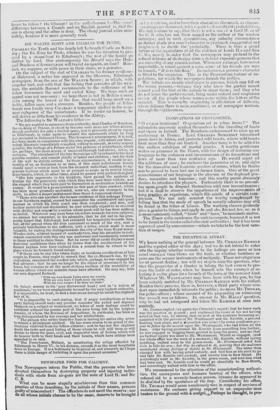INNOVATIONS OF CONVENIENCE.
" 0 CURAS 110MilIRM ! 0 quantum est in rebus inane !'° The • naturalists anxiously applied themselves to the breeding of toads and vipers in Ireland. The Bourbons endeavoured to raise up an aristocracy in France. Lord CHARLES SOMERSET introduced game-laws in Africa, and. protected wild beasts, where wild beasts hunt more than they are hunted. Another fancy-is to be added to the endless catalogue of mortal pranks. A worthy gentleman writes on grammar in the Times. with the design of restoring our language to the rudeness and inconvenience of its formations and laws of more than two centuries ago. He would reject all the additions of ease ; he eschews the possessive Or IT, and sighs - for the masculine and feminine genders of nouns, which he thinks can be proved to have had use in former times. One of the great conveniences of our language is the absence of the deplored gen- • ders, maseuline and feminine ; and' this worthy purist obviously • desires to introduce the plagues. Fortunately there is no prevaila ing upon-people to disquiet themselves with new incumbragees.;'• but it la. droll to observe the impatience of the improventWits Of long pra4Ce..-ore experienee, which fills minds of • a Certain' Flexion. We. can only comfort the worthy eomPlaiiimifiy telling..himethat the mode of speech he seoretlyadraires may still be found in the tribes of labour. The working classes generally give a .gender to things, and apply he and she, his and her, or, as it is more commonly called, " hisen—and " hem," toinanitnate matter. • The Times critic condemns the verb to compete, because it is not to be found in the hooks called classical authorities.; but it has been approved good by convenience—which we taketo be the best Sane- lion of usages. •


























 Previous page
Previous page